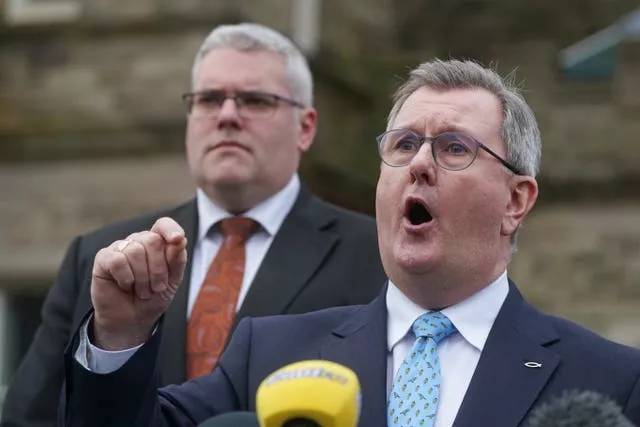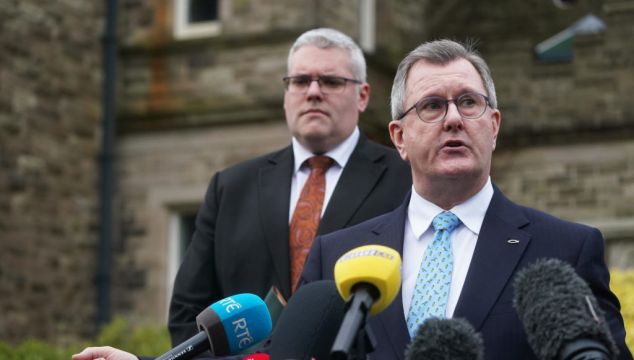The new Stormont powersharing executive will be united in dealing with the “unfinished business” of funding for public services in Northern Ireland, DUP leader Sir Jeffrey Donaldson has said.
Party leaders met at Stormont Castle to discuss the key priorities for the incoming executive ahead of it being formed on Saturday.
The DUP has given the green light for the recall of the Assembly on the back of its deal with the Government, which the party leader says has effectively removed the so-called Irish Sea border for goods moving from Great Britain to, and staying in, Northern Ireland.
On Thursday, two pieces of legislation contained in the agreement to resurrect devolution were fast-tracked through the British House of Commons.

Speaking following the meeting with other parties, the DUP leader said: “It is important when the executive meets that we have a real sense of what those priorities are for everyone in Northern Ireland.
“We are looking forward to the Assembly meeting tomorrow, going through the formalities, getting devolution restored.”
He would not be drawn on who his party will nominate for the role of deputy first minister – an office that wields the same powers as the first minister.
However, there has been speculation that Lagan Valley MLA Emma Little-Pengelly will take on the role.
The UK government has offered a £3.3 billion (€3.9 billion) package to secure Northern Ireland’s finances when the Assembly returns, including £600 million to settle public sector pay claims.
However, Sir Jeffrey Donaldson indicated that the parties would be working together to secure more cash from the Treasury.
He said: “We had a really good discussion around the table with the other parties. We agreed with the other parties that this is a priority, you will hear more about that in the coming days.
“There is agreement about what we need to get from the Government.
“You will not have to wait long to see the new executive in action, making those priorities clear to the Treasury and pressing them for additional funding which is required. The finance piece is unfinished business which we intend to finish.”
He also has said he will “hold the Government’s feet to the fire” to ensure it delivers on the deal which has restored devolution, set out in a command paper titled Safeguarding the Union.
“There is undoubtedly a trust issue here,” the DUP leader told BBC Radio Ulster.
“I will hold the Government’s feet to the fire, there are new mechanisms. I’m not just relying on the UK Government.
“There’s a new independent monitoring panel to be established under this agreement, which will hold the Government’s feet to the fire as an independent body.”

Ulster Unionist Party leader Doug Beattie confirmed his party will enter the Northern Ireland executive when it is restored.
He said he saw a “sense of cohesion” among the parties which would form the executive.
When the Northern Ireland Assembly does reconvene at Parliament Buildings on Saturday, it will witness the historically significant moment of the appointment of its first nationalist First Minister, Sinn Fein’s Michelle O’Neill.
Ms O’Neill and Alliance Party leader Naomi Long also attended Friday’s meeting, but left without speaking to the media.

While Sir Jeffrey Donaldson has secured the backing of a majority of party colleagues to accept the deal, there are those within the DUP who remain deeply sceptical of the proposed agreement to restore powersharing.
The DUP leader is also facing opposition outside his party.
However, the DUP leader was given a significant boost on Friday when a high-profile Orange Order chief declared his personal support for the package.
Grand Secretary of the Orange Order Mervyn Gibson, writing in the Belfast Telegraph, said while the deal was not perfect, it was a “win for unionist determination and unity, and needs to be accepted as such”.
On Friday a former attorney general for Northern Ireland rejected the contention that a Government deal to restore Stormont had removed an Irish Sea border.

John Larkin KC was commissioned by several vocal opponents of the agreement to assess the legal effect of the measures.
The legal opinion was commissioned by TUV leader Jim Allister, loyalist activist Jamie Bryson, former Brexit Party MEP Ben Habib and Baroness Kate Hoey.
But Sir Jeffrey said he “fundamentally disagreed” with the conclusions of Mr Larkin’s legal opinion.
The UK government has faced questions in Parliament from Brexiteer backbenchers who have expressed concern that the deal agreed with the DUP would place limits on the UK’s ability to diverge from EU regulations.
Ministers have sought to reassure MPs that the measures will not affect the UK’s capacity to diverge.
The paper commits to replacing the Windsor Framework’s green lane process at Northern Ireland ports, which requires percentages of goods to be checked as they arrive from Britain, with a “UK internal market system” that will govern the movement of goods that remain within the UK.

Checks would still be carried out but on a risk-based/intelligence-led model to combat illegality and disease, rather than routine stops of disembarking lorries.
Businesses using the internal market system would also need to be signed up to a trusted trader scheme.
The measure to reduce checks on British/Northern Irish trade is part of a wide-ranging deal agreed between the DUP and the UK government that would bring about the restoration of devolved government in Northern Ireland after a two-year hiatus.







